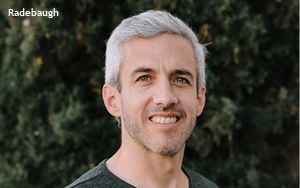
Every year, brands in the skincare industry
struggle with the same challenge: making sunscreen's role in skin cancer prevention sound as urgent as ever. Russell Radebaugh, vice president of marketing for Sun Bum, a surf shop favorite now owned
by SC Johnson, tells D2C Insider how it's freshening its annual skin cancer initiative with an effort called "Know your Spots."
D2C Insider: Your core audience is hardcore sun lovers, including surfers, skaters and skiers. How hard is it to find a way to get through with a safety message that hasn't changed much?
Russell Radebaugh: It's a challenge every year. We've tried to differentiate ourselves in how we talk about skin cancer awareness, especially this year. We're not using scare tactics. And we
lean into kind of a fun way to approach what is a very serious topic. In the past, for instance, we've done something called Banana Suit Fridays. The idea is that everyone should be protected from
head to toe, like a banana. This year, we decided the approach should make it easy and tie back to the banana idea.
advertisement
advertisement
D2C Insider: How so?
Radebaugh: We took a quarter turn
to the right. The "Know Your Spots" campaign takes a simple approach to recognizing funky skin spots, including how to do a self skin check. We've also partnered with the Skin Cancer Foundation so
people can find a nearby dermatologist. And we're sponsoring the foundation's mobile skin cancer screening and education program, which will provide free screenings and educational materials in 28
cities. We're doing events, like a block party we held recently at our headquarters in Encinitas, California. And we've put together educational materials that we think are our simplest yet.
D2C Insider: Explain why simple matters. Some might argue that sunscreen has gotten highly complicated for consumers: Is the mineral form better, for instance, or does a product harm coral
reefs?
Radebaugh: It has. And we make many different formulations, from a mineral line to fragrance-free. We've got formulations for kids and babies, too. That's because the best
sunscreen is the one you will use. We've also made our website more robust, adding in-depth information on the harmful effects of the sun and how to prevent them.
D2C Insider: How do
you make that fun?
Radebaugh: We hope to link it back to the banana theme. Bananas get spots when you leave them out. So do people. We want to teach them how to check those spots. And
from there, we want to hook them up with a derm. Those checkups take 30 minutes. The exciting thing is that even though we're just getting started, we've already had three people say the effort got
them to a dermatologist and that they had some signs of melanoma. Three isn't a big number, but it's a start. And that's why we're doing this.
D2C Insider: Consumers have been hearing
skin-cancer prevention messages for decades. What stops them from seeing a dermatologist?
Radebaugh: Life just gets in the way. We all know we should see the dentist regularly, too --
there are many things we should be doing. We hope this campaign helps people start small, checking spots. And hopefully, it will become a habit.

D2C Insider: This is a
crowded and competitive category, with rivals ranging from other D2C brands, like Supergoop, and those sold in retail, like Coppertone, along with many skincare products that incorporate SPF. And
you’re sold in multiple channels now, too. How do you stand out?
Radebaugh: It's an extremely hot category, and we compete against legacy brands and the Supergoops of the world.
From early on, we knew we would not out-compete any big brands on claims. They've got massive R&D teams and spend a ton of money on ingredients and formulations. We've also got great formulas, but
we focus on lifestyle and our communities. That includes nonprofit partners or endemic surf and skate partners. How do we help tell their stories and lift them up? That's why people love Sun Bum.
D2C Insider: Who is your core audience?
Radebaugh: We skew more female, and over-index in millennial and Gen Z audiences. And, of course, sun care always does better in the
Sun Belt. We want to help people who love to live in the sun.
That psychographic difference is always the most surprising thing about our brand. People buy a product because of how it makes
them feel. People see our stickers on skateboards and surfboards, and they like it. Kids and adults, they all like Sonny, our ape mascot. To us, that's exciting because it is what will help us move
the needle on skin cancer.
This has to be a generational change, and it's already happening. We're not going to see changes in cancer rates overnight. But statistics are going in the right
way, and that's an inspiration to us.